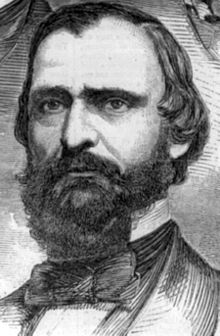
Summary
John Durant Ashmore (August 18, 1819 – December 5, 1871) was a slave owner,[1][2] U.S. Representative from South Carolina, and a cousin of Robert T. Ashmore.
John Durant Ashmore | |
|---|---|
 | |
| Member of the U.S. House of Representatives from South Carolina's 5th district | |
| In office March 4, 1859 – December 21, 1860 | |
| Preceded by | James L. Orr |
| Succeeded by | District eliminated (Robert Smalls after district re-established in 1875) |
| 13th Comptroller General of South Carolina | |
| In office 1853 – 1857 | |
| Governor | John Lawrence Manning James Hopkins Adams Robert F.W. Allston |
| Member of the South Carolina House of Representatives | |
| In office 1848 – 1853 | |
| Personal details | |
| Born | August 18, 1819 Greenville District, South Carolina, US |
| Died | December 5, 1871 (aged 52) Sardis, Mississippi, US |
| Resting place | Sardis, Mississippi, US |
| Political party | Democratic |
| Profession | planter |
Early life and education edit
Born in Greenville District, South Carolina, Ashmore attended the common schools. He studied law and was admitted to the bar but never practiced. He engaged in agricultural pursuits.[3]
Political and business career edit
Ashmore served as member of the South Carolina House of Representatives 1848–1853 and as Comptroller General of South Carolina 1853–1857. Ashmore was elected as a Democrat to the Thirty-sixth Congress and served from March 4, 1859, until his resignation on December 21, 1860, upon the attempted secession of South Carolina from the United States of America.[4]
He served as chairman of the Committee on Mileage (Thirty-sixth Congress).
He ran a plantation, but his journals do not record how many slaves he owned.[2]
Military career edit
During the Civil War, Ashmore was elected colonel of the Fourth South Carolina Regiment, but resigned before the regiment was called into service.[3] After the Civil War, he sought a pardon for having aided in rebellion.[5]
Death and legacy edit
He died in Sardis, Mississippi, December 5, 1871. He was buried in Black Jack Cemetery, near Sardis, in Panola County, Mississippi.[3]
Sources edit
- ^ "Congress slaveowners", The Washington Post, 2022-01-19, retrieved 2022-01-23
- ^ a b "John D. Ashmore plantation journal, 1853-1859. – African American Documentary Resources". Retrieved 2022-01-23.
- ^ a b c Who Was Who in American History - the Military. Chicago: Marquis Who's Who. 1975. p. 18. ISBN 0837932017.
- ^ "SOUTH CAROLINA AND THE FRANKING PRIVILEGE". The New York Times. 1861-01-30. ISSN 0362-4331. Retrieved 2022-01-23.
- ^ "APPLICANTS FOR PARDON.; List of all the high Military and Civil Rebel Leaders now Suing for Pardon The Applications Suspended for the Present. MEMBERS OF REBEL CONGRESS. GENERAL OFFICERS OF THE REBELLION". The New York Times. 1865-10-25. ISSN 0362-4331. Retrieved 2022-01-23.
- United States Congress. "John D. Ashmore (id: A000316)". Biographical Directory of the United States Congress.


